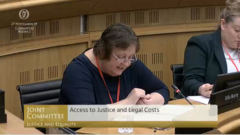FLAC attended JOC on ‘Access to Justice and Legal Costs’
27 November 2019

The Joint Oireachtas Committee on Justice and Equality heard today from legal rights group FLAC in relation to the issue of ‘Access to Justice and Legal Costs’.
In their opening statement and submissions to the Committee, FLAC expressed its concern that only those with very significant resources, the small minority in receipt of legal aid, or those with ‘no foal no fee’ arrangements with their lawyers have reasonable access to justice in our legal system. FLAC Chief Executive Eilis Barry called for an urgent root and branch review of the provision of civil legal aid.
FLAC made a number of recommendations to the Committee, including the poverty/equality proofing of court fees and recommended changes in court forms and procedures to make them clear, practical and accessible, particularly for lay litigants and people with disabilities.
In its submission, FLAC included numerous examples of complex and obscure court procedures and recommended that a broadly drawn group of relevant stakeholders – such as the Court Services, Citizens Information Board, IHREC, the NDA, NALA and relevant NGOs and human rights groups – be formed to consider the updating of the forms and procedures to ensure accessibility and clarity.
FLAC also recommended changes to remove barriers to public interest litigation, such as the introduction of multi-party actions and third-party litigation funding. FLAC also set out the importance of developing pro bono legal practice, and among its suggestions was the development of a public procurement model for public legal services requiring all legal services to sign up to a target of pro bono hours per year.
At the Committee hearing FLAC Chief Executive Eilis Barry outlined the broad social value of access to justice:
“It has been FLAC’s experience that people who are socially disadvantaged very often experience legal problems in accessing social welfare, housing and addressing unemployment, many of which might occur at the same time: the greater the vulnerability, the greater the number of justiciable issues and the greater the extent of social exclusion. Solving one of the legal issues has a beneficial impact in and of itself and may also have a knock-on beneficial effect in other areas and may improve social inclusion.
Access to justice is also essential to democracy. Laws made by this Oireachtas, such as the important new socially protective provisions contained in the Domestic Violence Act 2018 and the Land and Conveyancing Law Reform (Amendment) Act 2019, are only effective if they can be enforced.”
/ENDS
Notes to editors:
- Eilis Barry is available for interview.
- FLAC’s submissions are available on our website at https://www.flac.ie/publications/category/policy/
About FLAC (Free Legal Advice Centres):
FLAC is a human rights organisation which exists to promote equal access to justice. As an NGO, FLAC relies on a combination of statutory funding, contributions from the legal professions and donations from individuals and grant-making foundations to support its work.
FLAC offers basic legal information through its telephone information line (1890 350 250) and free legal advice through its network of volunteer evening advice centres – more at www.flac.ie/help/.
FLAC is an Independent Law Centre that takes on cases where this is in the public interest. FLAC also campaigns on a range of issues, including consumer credit, personal debt, fairness in social welfare law, public interest law and civil legal aid. FLAC operates the Public Interest Law Alliance (PILA), which seeks to engage the legal community and civil society in using the law to advance social change.